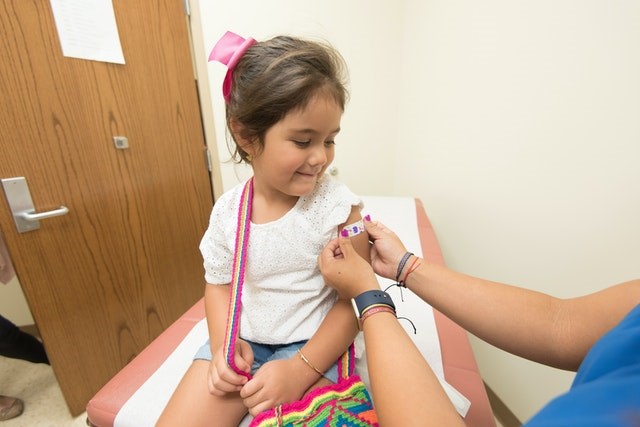Category Archives: Children’s Health
When Do You Need To Visit Children’s Clinic?
While you may take your children to your local Jacksonville children’s clinic when they fall sick, it may also help to go on wellness visits as part of their preventive healthcare. By partnering with your pediatrician, you can help the doctor monitor your child’s health and ensure that he or she is developing normally. If there are any health issues, it will be possible to catch them early on and take appropriate measures to ensure your child remains healthy.
So, when do you need to visit a children’s clinic?
According to the U.S. Department of Health and Human Services, parents should take their children for at least seven wellness visits between one to four years of age. From the age of five and onward, an annual wellness visit will be sufficient for most healthy children.
As per the comprehensive health guidelines created by the American Academy of Pediatrics (AAP), the recommendation is to take your child for his or her first wellness visit to a children’s clinic when he or she is three to five days old. You can follow this with wellness visits when your child is one month old, two months old, four months old, six months old, nine months old, one-year-old, one year and three months old, and one year and six months old. Thereafter, you can follow a yearly visitation schedule for wellness checkups.
Please note that these are general guidelines. It is up to you to decide on arranging for wellness visits to your local Jacksonville children’s clinic more frequently or less frequently as per his or her health.
Why is it important to visit a children’s clinic?
It is important to visit a children’s clinic for the following reasons:
Maintenance of good health: Rather than seeing the doctor after your child falls sick and then attempting to find a solution, it may be better to visit while the child is healthy and get recommendations to maintain his or her good health. The main benefit of wellness visits is that the pediatrician can regularly assess your child’s health and attempt to prevent any serious health issues before they arise.
For instance, if your child tends to develop a runny nose at certain times in a year, it could be an indication of an allergy. The doctor can then suggest preventive steps to keep the allergy under control.
Monitoring your child’s development: By taking your child on regular wellness visits to your local Jacksonville children’s clinic, the pediatrician will be able to monitor his or her mental and physical development. It will be possible to ascertain that your child is developing in a normal way for his or her age. If not, the doctor may be able to prescribe an appropriate diet, exercises, lifestyle changes, and medications.
Raising health-related concerns: As a parent, you may notice certain health-related issues about your child. You can present these concerns to the pediatrician and get expert medical advice on dealing with them.
What to expect when you visit a children’s clinic?
When you visit a children’s clinic, you can expect the following:
• The pediatrician or the pediatric nurse will check your child’s temperature, blood pressure, heartbeat, and oxygen level.
• The pediatrician or the pediatric nurse will measure your child’s height, weight, and head circumference and check if these measurements align with what is normal for that specific age.
• The pediatrician will examine your child’s vision and hearing ability, reflexes, muscle tone, and muscle strength.
• The pediatrician may inquire about and record your child’s eating habits and inform you about the nutrition requirements for staying healthy.
• The pediatrician may inquire about and offer advice regarding your child’s sleep routine, hygiene habits, and dental care.
• The pediatrician may inquire about and make suggestions to improve your child’s social, intellectual, and behavioral development at school, with friends, and at home.
The pediatrician will maintain a record of their examination. It is a good idea to compile a list of questions to ask the pediatrician before you and your child visit your local Jacksonville children’s clinic. That way, you will not forget anything essential. Most pediatricians are happy to respond to parental concerns and partner with them to ensure their children remain healthy.
What to Consider Before Selecting the Children’s Clinic
As a parent, you must ensure that your child receives the best healthcare available for their continuing well-being. That is why you need to be extra careful about screening the pediatrics clinics in your area. By choosing the right Jacksonville children’s clinic, you can get the proper treatment for all your child’s health needs until they turn 18.
Things to Consider Before Selecting a Children’s Clinic
Here are a few things to consider before selecting a Jacksonville children’s clinic:
Pediatrics Services Offered
You can visit the pediatrics clinic’s website to find out about the pediatrics services it provides. Ideally, the clinic should provide wellness check-ups from newborns to teens, conduct vision and hearing exams, treat illnesses and chronic conditions, and administer medications, stitches, and IV fluids. It must also undertake lab testing and have the facility to keep patients for overnight observation. If your child has any special medical needs that the clinic has not listed in its services, you can contact the staff to inquire if they can provide these.
Credentials of the Pediatricians
Pediatricians must have completed four years of medical school, three years of residency, and have a state license to practice. You may find this information on the website of the Jacksonville children’s clinic, and the pediatrician may also have framed credentials in their office. You may also want to check if they have a voluntary certification from The American Board of Pediatrics. Along with endorsing their medical competence and professionalism, it shows they participate in continuing education and keep themselves updated on the latest medical developments in the pediatrics field.
Patient Testimonials
By reading patient testimonials and checking how they have rated the clinic’s pediatricians and services, you can get a clear idea about what to expect if you register with that Jacksonville children’s clinic. You can review patient ratings for politeness and professionalism, quick appointments, up-to-date medical procedures, and effective treatments. Based on the positive reviews and other considerations, you can decide if the clinic will suit your child.
Treatment Philosophy of the Pediatricians
The Jacksonville children’s clinic may include its treatment philosophy on its website. You can also contact the pediatrician and discuss the approach they will take towards treating your child. It may enable you to discover if the pediatrician is polite, friendly, open-minded, and reassuring. Given that your child might be seeing them for many years, you want to find someone approachable. They should be willing to explain the details of your child’s health issues, get questioned about the treatments they recommend, and consider alternative options. You can also visit the clinic and observe how the staff interact with patients.
The reputation of the Pediatrics Clinic
Along with researching clinics online, it is a good idea to get clinic recommendations from your family, friends, neighbors, colleagues, and acquaintances. They are likely to give you an honest assessment based on their experiences. If the people you trust and those in the locality who frequent the pediatrics clinic have positive things to say about its services, it could be the right one for your child. You can also ask your family doctor to recommend a clinic.
Location of the Pediatrics Clinic
Try to find a Jacksonville children’s clinic that is within walking distance of your home, within a short driving distance, or at least easily reachable by public transportation. Children tend to have more accidents, falls, scrapes, bruises, broken bones, and other health concerns than adults and, therefore, may require more visits to a medical center. By choosing a clinic that you can reach in minutes, you can ensure that your child will receive immediate treatment in an emergency.
Pediatrics Clinic Operating Hours
Find out if the regular operating hours of the pediatrics clinic are convenient for you and if it remains open on evenings, weekends, and public holidays. It is also essential to check if the clinic takes same-day or last-minute appointments and is willing to treat your child at any time in an emergency. You should also ask if it will accept your insurance. If it cannot accommodate you in an emergency or does not accept your insurance provider, you may need to find another pediatrics clinic for your child’s healthcare.
Pediatrics – How They Help Your Child
Have you ever wondered what the pediatric associates of Jacksonville actually do? Here are the important things you need to know about pediatricians, their responsibilities, and how to find the right clinic for your child and family.
What is a Pediatrician?
While many people are familiar with medical doctors, they don’t necessarily understand all the many ways in which specialists interact with regular physicians. In fact, many medical specialties for doctors in the US aren’t really part of people’s everyday language. Jacksonville’s pediatricians, also known as the pediatrics associates of Jacksonville, are doctors who specialize in medicine for children. Specifically, they often deal with patients from birth until your child is 18 years old. These doctors differ from obstetricians, or obstetrician-gynecologists, in that they are not specialists in pregnancy or childbirth, but essentially in most healthcare needs after birth until the child reaches 18.
Ideally, new parents will connect with pediatric associates of Jacksonville before they give birth, or very shortly afterwards, so that they can have a seamless line of healthcare for their new arrival. This is where a specialized and dedicated medical office for kids can be extremely important. With the right facility employing pediatricians, you can ensure that your child gets the healthcare it needs.
What are the Responsibilities of Pediatric Associates of Jacksonville?
Now that we know what pediatricians do and where people can often find them, let’s break down their actual responsibilities. Broadly, the pediatrics associates of Jacksonville have six major responsibilities:
1. Perform medical exams: One of the first things that will ever happen when you visit pediatric associates of Jacksonville is a medical examination of your child. This is one of the most common and regular responsibilities of nearly every pediatrician. Medical examinations are usually quick and non-invasive; they are often simply routine. Of course, these medical professionals can also perform medical exams for many common injuries and ailments, from broken bones to common colds and other things. Everything from throat examinations to reflex, pulmonary, and respiratory tests are quite common for a pediatrician.
2. Develop diagnoses: Once exams are completed, pediatrics associates of Jacksonville will often diagnose any issues that fall within their area of expertise. Diagnoses often revolve around treating specific issues and ailments, but they can also be around eliminating other potential health issues. Many pediatricians work backwards, using common tests to eliminate possible issues before landing on the specific problem or series of problems that are causing the issue.
3. Offer referrals to specialists: If the diagnosis falls into another area of medicine, then pediatric associates of Jacksonville will instead refer to specialists. This is often the case for many common issues, especially non-life-threatening ones. A rash, for example, may require the expertise of a dermatologist. Some broken bones may require the attention of an orthopedist.
4. Create treatment plans and options: The most common stage after diagnosis is the treatment plan and treatment options stage. The best pediatrics associates of Jacksonville work directly with parents and patients to ensure the right treatment options are considered and taken depending on the lifestyle and situation of the people involved. Treatments are often paired with future visits to ensure the plan is working and addressing the problems. If a specialist is involved, future appointments may be required for both the specialist and pediatrician.
5. Communicate with children and parents: While being a doctor takes years of intense scientific education, much of doctor training today is focused on communication. After all, without clear communication, patients can often be confused and may even incorrectly follow treatment plans. That is why one of the most important things that pediatric associates of Jacksonville do is communicate. They can often communicate with children and parents in tandem. As the child gets older, they may feel more comfortable visiting their pediatrician on their own, which is at the discretion of the parents.
How to Choose the Right Pediatrician for Your Child and Family
When it comes to medical care and your child, you will need someone who specializes in child healthcare, and a clinic that is dedicated to their wellbeing. When looking for pediatrics associates of Jacksonville, be sure to look for a conveniently located clinic with 24/7 availability. That way, you can ensure that your child is getting the healthcare attention they need, when they need it.
How to Reduce Fear Among Children When Visiting the Pediatrician
Having a kid necessitates frequent visits to the doctor to discuss significant health concerns. However, most of the children have an inherent fear when it comes to visiting a pediatrician. They often associate it with vaccines or other shots, and seeing an unfamiliar face does not help the situation.
Often parents have to delay an appointment because of extreme anxiety faced by their children. Also, a lot of effort goes into calming the kid at a doctor’s visit, and you may even miss out on the important discussion.
Creating a relaxed and pleasant experience for your kid in their next doctor’s visit is essential to get the most out of your appointment with a pediatrician. Here is a list of a few tips that can help soothe your kid on their net trip to a pediatrician.
1. Be available for your kids’ doctor visits.
Parents today have a busy schedule, and managing parenthood can become quite challenging. To relieve themselves of some stress, many parents may seek help from grandparents or a caretaker. While there is no harm in leaving your bundle of joy into reliable and safe hands, we strongly recommend accompanying your child to their doctor’s visit.
If your schedule does not permit you to accommodate all the visits to a pediatrician, you should go for the first few. A kid will feel calm and secure in your presence which will help them relax during their appointment. Children may get scared seeing new faces around them, and having you by their side will let them be at ease.
2. Have a practice session at home
The best way to eradicate fear is by educating your children, and this also applies to the fears that your child has regarding a doctor’s appointment. Having a practice session at a comfortable place like home will help children get familiarized with the idea.
You can play out the check-up session they will be going through with a toy doctor kit. This will ensure that your child is aware of the process in the next doctor’s appointment. Also, use the correct name of the devices to educate your kid about different instruments used in a doctor’s visit. Also, they will become familiar with these names, which will eliminate the fear of the unknown.
You can also create awareness by introducing them to the concept in the form of a story. Your kids will learn and accept it in a relaxed state, and this will rule out any unnecessary anxiousness.
3. Timing is the key.
Generally, toddlers follow a routine throughout their day and have a fixed feeding and nap time. Delay in their schedule can make them cranky. Make sure your doctor’s appointment does not mess with your pre-planned routine.
Jax pediatricians will be more than happy to help you with timing that suits your child’s routine. Timing when your child is fed and well-rested will help them have a pleasant experience at their doctor’s meeting.
Also, prepare yourself for the long waiting hours that you may need to face on busy days. Bring some healthy snacks, toys, and books to keep your kid distracted and entertained. Also, you can bring their favorite soft toy to give them much-needed comfort.
4. Give them a pleasant treat afterward.
Promising your kid a pleasant treat after the appointment will help them look forward to the doctor’s appointment and relieve some of their anxiety. This will also help create positive memories associated with a doctor’s visit.
Shower your kids with hugs and kisses after the appointment and let them know that they did a good job. Take your child for a fun activity that they enjoy. Also, you can offer them their favorite chocolates or other desserts as a treat.
However, do not make the good behavior a pre-condition for the treatment as this can create undue pressure on the child and make them feel nervous.
These are some of the ways you can help your kid feel relaxed at their next pediatrician’s appointment and help them have a pleasant experience.



